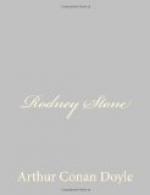“You will permit me to compliment you, my dear Mary,” said he, in a voice which was the most mellow and beautiful that I have ever heard. “I can assure you that the country air has used you wondrous well, and that I should be proud to see my pretty sister in the Mall. I am your servant, sir,” he continued, holding out his hand to my father. “It was but last week that I had the honour of dining with my friend, Lord St. Vincent, and I took occasion to mention you to him. I may tell you that your name is not forgotten at the Admiralty, sir, and I hope that I may see you soon walking the poop of a 74-gun ship of your own. So this is my nephew, is it?” He put a hand upon each of my shoulders in a very friendly way and looked me up and down.
“How old are you, nephew?” he asked.
“Seventeen, sir.”
“You look older. You look eighteen, at the least. I find him very passable, Mary—very passable, indeed. He has not the bel air, the tournure—in our uncouth English we have no word for it. But he is as healthy as a May-hedge in bloom.”
So within a minute of his entering our door he had got himself upon terms with all of us, and with so easy and graceful a manner that it seemed as if he had known us all for years. I had a good look at him now as he stood upon the hearthrug with my mother upon one side and my father on the other. He was a very large man, with noble shoulders, small waist, broad hips, well-turned legs, and the smallest of hands and feet. His face was pale and handsome, with a prominent chin, a jutting nose, and large blue staring eyes, in which a sort of dancing, mischievous light was for ever playing. He wore a deep brown coat with a collar as high as his ears and tails as low as his knees. His black breeches and silk stockings ended in very small pointed shoes, so highly polished that they twinkled with every movement. His vest was of black velvet, open at the top to show an embroidered shirt-front, with a high, smooth, white cravat above it, which kept his neck for ever on the stretch. He stood easily, with one thumb in the arm-pit, and two fingers of the other hand in his vest pocket. It made me proud as I watched him to think that so magnificent a man, with such easy, masterful ways, should be my own blood relation, and I could see from my mother’s eyes as they turned towards him that the same thought was in her mind.
All this time Ambrose had been standing like a dark-clothed, bronze-faced image by the door, with the big silver-bound box under his arm. He stepped forward now into the room.
“Shall I convey it to your bedchamber, Sir Charles?” he asked.
“Ah, pardon me, sister Mary,” cried my uncle, “I am old-fashioned enough to have principles—an anachronism, I know, in this lax age. One of them is never to allow my batterie de toilette out of my sight when I am travelling. I cannot readily forget the agonies which I endured some years ago through neglecting this precaution. I will do Ambrose the justice to say that it was before he took charge of my affairs. I was compelled to wear the same ruffles upon two consecutive days. On the third morning my fellow was so affected by the sight of my condition, that he burst into tears and laid out a pair which he had stolen from me.”




